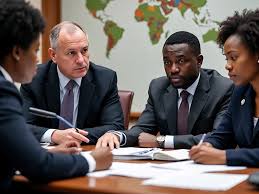The United Kingdom’s decision to cut down its foreign aid budget even further has sparked serious concerns across Africa, with experts warning that the move could affect key development programmes and slow down progress in health, education, and economic stability in several countries.
The latest reduction in aid, announced as part of a wider cost-cutting plan by the UK government, will hit bilateral support to countries like Nigeria, Kenya, and Ethiopia the hardest. These countries have, for many years, relied on UK assistance to fund important projects such as maternal healthcare, agricultural improvements, and basic education for poor communities.
Development specialists and African government officials say the aid cuts will put pressure on vulnerable populations and risk reversing years of development gains. A senior government official in Nairobi, Kenya, warned that “this reduction risks stalling progress on critical infrastructure and social services,” especially in rural and underserved areas.
The UK government, now under the Labour Party led by Prime Minister Keir Starmer, defended the decision, blaming financial problems inherited from previous governments. A spokesperson for the UK Foreign Office said, “We remain committed to international development but must balance that with domestic priorities.” While Starmer has promised to return to the earlier 0.7% foreign aid commitment once the UK’s economic condition improves, he has not given any specific date for this reversal.
The UK’s foreign aid policy has changed significantly over the past few years. Under the previous commitment, the UK was known globally for allocating 0.7% of its Gross National Income (GNI) to overseas development assistance—a commitment backed by law. However, since 2020, that figure was slashed to 0.5% and now has been further reduced to 0.3%. The government says the new plan will focus more on emergency responses in conflict-affected regions like Gaza, Sudan, and Ukraine, as well as support to global institutions like the World Bank, rather than direct funding to African governments and projects.
Many in Africa are disappointed by the decision. Nigeria, Africa’s most populous country, has received UK support for maternal clinics, child vaccination programmes, and education funding for girls. Kenya and Ethiopia have benefited from agricultural reforms and rural healthcare projects under UK-funded schemes.
The latest move comes on the heels of another blow from the United States, where the previous Trump administration cut several USAID programmes that once supported African countries in areas such as agriculture, disease prevention, and climate adaptation. With both the UK and the US pulling back on their support, African nations are being forced to re-evaluate their development plans, just as they are dealing with debt problems, rising inflation, and the impact of climate change on farming and water supply.
Experts say the UK’s aid cuts could weaken Africa’s ability to respond to public health emergencies and affect investments in human capital, especially for women and children. Some also fear it will damage long-standing diplomatic relationships.
“It’s not just about money; it’s about partnership and trust,” said a Nigerian civil society advocate. “If Africa can’t rely on its traditional allies in times of need, the trust that has been built over decades begins to fade.”
Though some of the redirected UK funds will still go to Africa through multilateral agencies, development actors argue that bilateral aid—direct support from one country to another—is often more effective for specific local needs. Bilateral aid gives room for partnerships with local stakeholders and helps tailor programmes to suit local realities.
Meanwhile, calls are growing for African governments to improve transparency, reduce wastage, and find new ways to raise funds domestically. Some are also exploring partnerships with non-Western countries like China, India, and the United Arab Emirates, which have increased their investments in Africa in recent years.
For now, the sharp cut in UK aid marks a turning point in Africa’s relationship with the global North. It is a reminder that foreign support is not always guaranteed, and African leaders may need to push for more regional cooperation and self-reliance in funding vital development initiatives.
